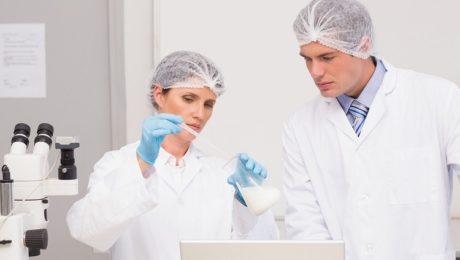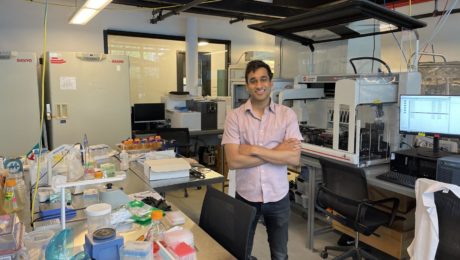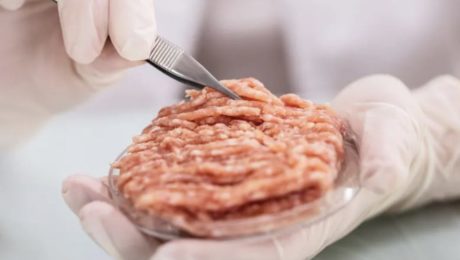Alt Protein Hype Missing Bigger Food Industry Solution
Will alternative proteins save the planet? A report by the International Panel of Experts on Sustainable Food Systems (IPES-Food) says alt proteins – or what they call “lab meat” – aren’t the answer. In a new report, these experts say major reforms need to be put in place to increase biodiversity of food, improve access to better nutrition and limit Big Food’s control over the food system.
Companies, governments and investors are turning to alternative proteins as a way to feed a rapidly growing population but, the panel notes, they don’t address the world hunger crisis.
“In reality they lead us back to the same problems of our industrial food system: giant agribusiness firms, standardized diets and industrial supply chains that harm people and the planet,” announces a video created by IPES-Food. “We need to change the system, not the product.”
Adds Phil Howard, lead author of the report: “It’s easy to see why people would be drawn to the marketing and hype, but meat techno-fixes will not save the planet. In many cases, they will make the problems with our industrial food system worse — fossil fuel dependence, industrial monocultures, pollution, poor work conditions, unhealthy diets, and control by massive corporations. Just as electric cars are not a silver bullet to fix climate change, these solutions are not going to fix our damaging industrial food system..”
The report suggests that, to feed a growing population, the food industry should focus on sustainable food systems, not a transition to alternative proteins. A healthy food system should be regional, nutritious and focused on how real food is produced.
Read more (IPES-FOOD)
- Published in Business
Are Alt Proteins GMO?
America is full speed ahead in the regulation of precision-fermentation-derived food, but Europe has yet to approve its first company. Why the difference?
Alternative protein regulatory expert Hannah Lester (from Amgen Regulatory Consulting) says the precision fermentation landscape is hugely unbalanced between the two regions. The U.S. Food and Drug Administration (FDA) has approved various fermentation-derived products through the “generally regarded as safe” (GRAS) distinction.
The European Food Safety Authority (EFSA), though, says proteins made using precision fermentation aren’t pure. The EU labels them as genetically modified organisms (GMOs).Alt protein companies disagree with this description.
For example, one of the largest precision-fermented products, Impossible Burger, was required to submit a GMO dossier to the EFSA. Lester says labeling these products as GMO has become “highly political” and is full of gray areas.. She adds that both areas will face pushback on how precision fermentation products are named.
“There is going to be opposition about what we call these products,” Lester says. “There may be a battle ahead with the traditional farming stakeholders and more conservative member states who have their own agenda and want us to call these proteins derived by precision fermentation [something else].”
Read more (Food Navigator)
- Published in Business
Do Alt Protein Brands Tarnish Food Shows?
Does allowing alternative protein or bio-tech brands into Natural Products Expo West distort the natural foods industry? An article in Forbes argues that the show producers’ decision to allow lab-created, animal-free products into this year’s event is “troubling,” “confusing” and “harmful.”
Expo West has long been the “it” show for established and startup companies in the natural and organic products industry. Forbes says allowing an alternative dairy brand to exhibit next to a legitimate plant-based product that uses organic ingredients is hurting higher-quality brands, “especially when biotech brands are claiming to be superior to plant-based, even as they attempt to co-opt plant-based messaging, as some do.”
Read more (Forbes)
- Published in Business
Microbial Farmers
An article in Modern Farmer highlights “the new generation of microbial farmers,” scientists using microbes to replace chemical additives in food.
At Kingdom Supercultures, co-founders Ravi Sheth (pictured) and Kendall Dabaghi have developed natural microbial strains that mimic additives “instead of having a library of artificial chemicals.” Scientists at the company use machine learning to explore millions of “uncharacterized microbes that live inside fermented food. They extract microbial strains, merge them with other isolates and design what they call ‘supercultures.’”
The end results are healthier compounds with flavors, textures and functional properties similar to their artificial – and less healthy – counterparts. Since the company launched in 2020, they’ve made additives for plant-based cheese and yogurt, vegan personal care products and a vegan butter exclusive to Eleven Madison Park restaurant in New York.
Read more (Modern Farmer)
- Published in Business
What’s In a Name? Label & Ad Errors Could Cost Alt Foods Big
As more companies enter the alternative protein marketplace, and more government leaders debate what should be legally considered meat, dairy and egg products, businesses need to be careful with their product names and label and advertising claims.
“It’s hard to think of anything more important than what you’re going to call the product. However, your freedom of invention is not limitless,” says Ricardo Carvajal,a food regulatory lawyer and director at the law firm Hyman, Phelps & McNamara, P.C. “The name must accurately identify or describe the basic nature of the food or its characterizing properties or ingredients. And this can be trickier than it sounds. What’s the composition of the product? What are its essential attributes? What’s it made from? How’s it made?”
Carvajal spoke on labeling and advertising at the Fermentation-Enabled Alternative Protein Innovation conference. Regulations for the young alternative protein industry are broad and confusing, he pointed out. Alternative foods have not been given a “standard of identity” by the FDA – the legal definition that dictates the composition of a food product, how it’s made and its name. Without formal federal direction regarding alternative foods, legislators across the country are making their own rules.
Governing Alt Food
A majority of states have considered regulating the labeling of alternative food products. So far, 32 states have proposed guidelines, and 15 of those have enacted legislation.
“It’s a bit of a smorgasbord in terms of the content of these state laws,” Carvajal adds. “This is going to remain a difficult issue for companies to navigate. If there’s a standard of identity, a federal law, that’s going to take precedence over state laws. But what we’re seeing is an absence of a federal law or a regulation to cover some of these issues or some of these product categories. That’s leaving the door open for the conventional industry to push for laws at the state level.”
This year the USDA plans to issue guidelines for labeling claims on food products made using animal cell culture technology, which will establish nomenclature and labeling requirements for those alternative proteins. The USDA also plans to provide direction on the labeling of plant-based milk alternatives by June 2022.
Carvajal points to the “soy milk saga” as a cautionary example. Milk is a formal FDA standard of identity, defined as ““the lacteal secretion, practically free of colostrum, obtained by the complete milking of one or more healthy cows.” Plant-based milk brands have been sent warning letters by the FDA, arguing a plant product is misbranded as milk. The soy industry has petitioned the FDA to establish soy milk as a common name, but the dairy industry has lobbied aggressively to enforce preserving traditional dairy product names.
Those FDA warning letters can be a big blow to a company — they’re published on the FDA website, so potential investors and customers can review. Letters are monitored by plaintiff’s lawyers, too. These attorneys specialize in suing companies on behalf of consumers, alleging consumers were misled by false claims. “Those actions can be quite expensive to defend,” Carvajal notes.
“Selecting or devising an appropriate name for a product can be a tricky exercise that requires simultaneous consideration of a number of factors,” he says. “The FDA does not view a name as a marketing opportunity.”
Types of Labeling & Advertising Claims
Though there are no formal legal definitions of alternative foods, alt brands do need to follow FDA, FTC and USDA labeling rules. These regulations include:
- Nutrient content (FDA oversight). A nutrient must have an established daily value to make a particular claim. For example, “Excellent source of protein” on a label requires the product to provide 20% of the recommended daily value of protein, while “Good source of protein” requires only 10-19%.
- Health (FDA oversight). This is a tightly-regulated area, Claims that imply a cause-and-effect relationship between a specific nutrient and a disease or health condition require scientific studies on humans. This research can take years to receive FDA approval.
- Structure/function (FDA/FTC oversight). This is the most popular type of claim on a food label because it doesn’t require review or approval in advance of going to market. Examples here are “Protein helps build strong muscles” and “Promotes a healthy immune system.” Still, a structure/function claim must be substantiated.
- Environmental benefit (FTC oversight). Green claims need to comply with the FTC’s Green Guides, which give guidance on environmental marketing claims. Carvajal advises brands to avoid using terms like “eco-friendly” on a product label or in advertising because “they’re impossible to substantiate.” There are a variety of environmental certifications and seals that are better options for a product label.
- Organic (USDA oversight). Organic food must meet USDA standards through the National Organic Program (NOP). Violations result in costly penalties.
- Natural (no official definition). Natural does not have a legal definition — the FDA permits use of “natural” if the food does not contain anything artificial or synthetic. Meanwhile, the USDA views natural as a minimally processed product with no artificial ingredients, with the determination based on the specific product c rather than a category. Carvajal says a natural claim is a “very high risk” for a brand because “the absence of a legally binding definition has enabled plaintiffs lawyers in a wide range of circumstances.”
“You should assume that virtually any claim that you use on labeling or advertising will be subject to regulation of some kind,” he adds. “The requirements that apply might be general in nature or highly specific. So to protect your business, you should have a formal internal review process to ensure that you properly vet all your claims.”
- Published in Business
2022 Alt Meat Trends & Challenges
“The landscape of cell-cultured meat, and even microbially fermented animal products, is a complicated place where futuristic technology, ethics, the law and business are all approaching the unknown together,” reads a Forbes article.
There are at least 60 companies globally now involved with cell- and fermentation-grown meat, and nearly a billion dollars was invested in the field in 2021 alone.
Animal-free meat, though, is facing growing pains. Forbes shares the trends and challenges in the rapidly-growing alternative protein industry. Some of their predictions and observations:
- Accelerator and incubator programs will help new companies start.
- Startups lead the pack, influencing larger companies to invest in their own animal-free lines.
- Truly animal-free options, as companies develop proprietary methods that don’t require animal input.
- Knowledge sharing, the trend that more companies will not gatekeep their intellectual property.
- Production of all “meats,” rather than just beef and chicken. (Companies are developing animal-free foie gras, fish maw and even zebra.)
- Alt breast milk, using stem cells.
- Cheaper products, as the higher prices of alternative proteins keep some consumers away.
- Regulatory challenges, as regulatory agencies debate terminology and labeling requirements.
Read more (Forbes)
- Published in Business
Chocolate Without the Cacao
Cacao is one of the most environmentally harmful and ethically dubious commodities produced on the planet. It plays a huge role in deforestation, uses an alarming amount of water and more than 2 million children work in cacao farms. Yet cacao hasn’t been reimagined the way other foods with similarly harmful footprints have.
“There’s a lot of ethical quandaries around the production of chocolate,” says Johnny Drain, PhD, co-founder of WNWN Food Labs. “Cacao is a huge contributor to climate change, and child labor and slave labor are hardwired into the supply chain.”
Drain’s nickname is the “Walter White of fermentation” because of his work helping pioneering restaurants and bars around the world incorporate fermentation into their food and drink. Now Drain can add “Willy Wonka of chocolate” to his resume. He is co-launching a cacao-free chocolate, next in the wave of alternative products designed to replicate flavor and texture without a harmful production cycle.
A Chocolate-Potato Connection?
WNWN (Waste Not, Want Not, pronounced “Win-Win”) happened by chance. About five years ago, Drain was boiling old, green potatoes, and leaned his head into the steam. He was surprised it smelled like chocolate.
“I had this light bulb moment where I thought ‘There must be some compounds within the skins that are also found in cacao and chocolate.’ I wondered — ‘Could I make chocolate from potatoes? What other weird and wonderful things could make chocolate?’” Drain says.
WNWN plans to release a small-run batch of their chocolate next month. Drain and co-founder Ahrum Pak, a former investment banker and fellow fermenter-turned-food-activist, are calling the product category choc.
WNWN’s choc ingredients are proprietary until its formal release but, as with traditional chocolate, they are plant-based and fermented. Drain describes them as familiar, whole ingredients that are common in an average person’s diet.
“It’s not a Frankenstein, lab-created product, mixing this potion with that potion. We take whole ingredients, we ferment them just as we would chocolate, then we end up with this delicious chocolatey paste that goes into a quite conventional chocolate-making procedure,” Drain adds.
WNWN also replaces cocoa butter — made from cacao pods — with plant-based oils. Cocoa butter is what gives traditional chocolate a silky, creamy texture as it melts in your mouth.
Fermented Flavors
At the heart of choc’s flavor, though, is fermentation.
“Cacao is fermented to make chocolate in the same way our product is fermented. We use similar, friendly microbes to create complexity,” he says. “We’re recreating that flavour profile of chocolate that we all know and love using the same fundamental techniques that are used to make chocolate.”
High-quality chocolate contains roughly 600 different flavor and aroma molecules. Cacao fermentation involves lactic acid and acetic acid bacteria, along with various yeasts, to create its flavor.
“If you didn’t have that cocktail of microbes, you would end up with something that only tastes vaguely like the chocolate we know and love,” he adds. “At the heart of this is fermentation. The product that we have, if we produced it without the fermentation processes, it wouldn’t taste anything like chocolate, just like if you eat a raw cocoa bean or even a roasted, unfermented cocoa bean, it doesn’t really taste like chocolate. You have to have that very complex cascade of chemical reactions, made possible by the fermentation, to get the final chocolate flavour.”
The Next Big Alt Movement?
Drain is quick to point out WNWN is not the only company trying to create what he and Pak have coined “alt-chocolate.” Three companies — QOA, Voyage Foods and Cali-Cultured — all officially launched in the past three months.
Some of these companies have been operating in stealth mode for a number of years but made official launches once word of competitors began to circulate. QOA and Voyage appear to be using approaches similar to that of WNWN. CaliCultured is using a syn-bio precision fermentation route to modify yeast cells to produce lab-grown cacao cells that are genetically identical to those found in the wild.
Drain says he’s encouraged by the other companies.
“It’s exciting that there’s multiple people working in this space,” he says. “Look at the plant milk space or alternative protein space — there’s definitely plenty of room in this marketplace too, and collectively we are all doing this because we care about the ethical and environmental damage being wrought by the current cacao supply chain.”
European and American consumers historically dominate chocolate sales, but chocolate sales all over the world are increasing.
Drain and Pak feel that a shake-up in the industry at the top is needed. Huge international producers are responsible for the vast majority of global chocolate. Mars, Nestle and Hershey promised over 20 years ago to stop using child laborers, but reports say the problem continues.Similarly, these companies pledged a decade ago to source more sustainable chocolate, but negative environmental problems from cacao continue to increase.
“The way in which we consume food has to change. It’s unrealistic that millions of tons of mass-produced cacao is somehow ethically- and sustainably-produced,” Pak says.
Drain adds; “So, really, we’re not anti-chocolate, we’re anti-big-chocolate produced in unethical, unsustainable ways.”
Recreating Food
Chocolate is merely the first challenge that WNWN wants to address. Coffee and vanilla are next, foods with similar human rights and sustainability concerns. The company is building a software system that can ideate fermentation pathways for creating sustainable, flavour-identical analogs to delicious – but unsustainable – products.
“When you really start looking at how most of the world’s food is produced and consumed, there are so so many cases where it’s produced in a really terrible and damaging way,” Drain says. But “the market wouldn’t have been ready for a product like this five years ago. People are becoming much more aware of where their food comes from. People are thinking about ‘How do I make my purchasing habits, my diet better for the planet in a way that I don’t have to sacrifice the flavors and taste that I love?’ There will be work to do. But people are more receptive now that fermentation is more of a household name than it was five years ago. I think the fact that more people want to remedy these challenges is brillant.”
Drain will be speaking FERMENTATION 2021 on “The Alt-Universe”
- Published in Business, Food & Flavor
- 1
- 2







